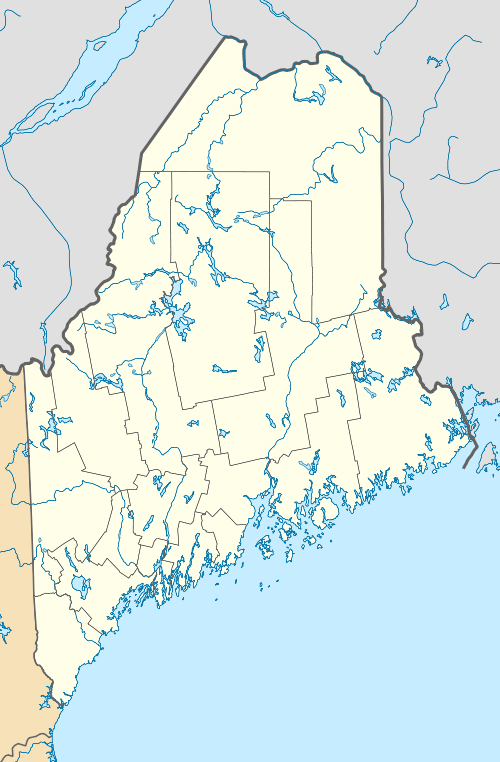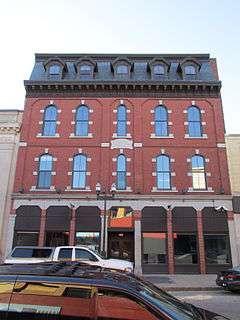Lyceum Hall
|
Lyceum Hall | |
|
Lyceum Hall | |
  | |
| Location | Lewiston, Maine |
|---|---|
| Coordinates | 44°5′51″N 70°13′6″W / 44.09750°N 70.21833°WCoordinates: 44°5′51″N 70°13′6″W / 44.09750°N 70.21833°W |
| Area | less than one acre |
| Built | 1872 |
| Architect | Charles F. Douglas |
| Architectural style | Second Empire, Other |
| MPS | Lewiston Commercial District MRA |
| NRHP Reference # | [1] |
| Added to NRHP | April 25, 1986 |
Lyceum Hall is a historic commercial building at 49 Lisbon Street in downtown Lewiston, Maine. Built in 1872, the Second Empire hall is one of the city's few surviving designs of Charles F. Douglas, a leading Maine architect of the period, and for a number of years housed the city's only performance venue. The building was listed on the National Register of Historic Places in 1986.[1]
Description and history
Lyceum Hall is located on the west side of Lisbon Street, the principal commercial street in downtown Lewiston. It is nominally a 3-1/2 story masonry structure, with a mansard roof providing space for a full fourth floor. The building facade is symmetrical, with a central one-bay section flanked by identical two-bay sections. The central section has the recessed building entrance on the first floor, and narrow round-arch windows on the second and third floors, set in a recessed brick panel. The remaining ground-floor bays all have commercial glass storefront windows, articulated by stone or brick piers. The outer bays on the second floor have segmented-arch windows, while those on the third floor are round-arched. The fourth floor dormers have segmented-arch windows. The main cornice (below the steep mansard roof section) is bracketed and dentillated, and a secondary cornice at the transition between the roof sections is dentillated.[2]
The hall was built in 1872 to a design by Charles F. Douglas, a prominent local architect. Douglas designed a number of Lewiston's downtown buildings during a flurry of construction after the American Civil War, but this is the only one to survive relatively intact. It originally housed a 1000-seat theater on the third floor, which was the city's only public performance venue until the construction of the city's Music Hall. The building underwent a full restoration in the 1980s.[2]
See also
References
- 1 2 National Park Service (2007-01-23). "National Register Information System". National Register of Historic Places. National Park Service.
- 1 2 "NRHP nomination for Lyceum Hall" (PDF). National Park Service. Retrieved 2015-10-27.
